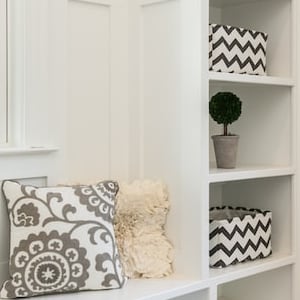cry cupboard: Idiom Meaning and Origin
What does ‘cry cupboard’ mean?
The idiom "cry cupboard" refers to a place where one goes to cry in private, away from others. It implies seeking solace or comfort while dealing with emotional distress.

Idiom Explorer
The idiom "laugh in one's sleeve" means to secretly or quietly find something amusing or funny without showing it openly.
The idiom "home away from home" refers to a place where one feels comfortable and at ease, as if it were their own home, despite being away from their actual residence.
The idiom "go into one's shell" means to become quiet, reserved, or withdrawn, usually due to feeling shy, embarrassed, or defensive.
The idiom "get the drawers" means to become extremely angry or outraged over something.
The idiom "get the dirty water off one's chest" means to confess or reveal something that has been bothering or troubling someone, in order to feel a sense of relief or release from the burden.
The idiom "get off one's chest" means to express or confess something that has been bothering or troubling someone, typically in order to provide relief or a sense of release.
The idiom "get a room" is used to playfully suggest that a couple who is engaged in overly affectionate behavior should find a more private place to be intimate.
"For crying out loud" is an expression of frustration or annoyance emphasizing the speaker's exasperation with a situation or person.
Decoding Tears Inside
In certain parts of the world, the idiom "cry cupboard" is used to describe a secret place where one can go to privately shed tears or express sorrow. While there is limited information available about this specific idiom, its origins are rooted in the concept of seeking solitude in times of emotional distress.
Although the exact origin of the term "cry cupboard" remains uncertain, it is speculated that it may have originated from the practice of individuals finding solace in small, enclosed spaces as a means of dealing with their emotions. This idiom seems to have emerged as a metaphorical expression, where crying is equated to being locked away in a cupboard. The notion of crying being a private act confined to a hidden space likely informs the formation and cultural understanding of the idiom.
It is interesting to note that the idiom "cry cupboard" is not widely recognized or commonly used in contemporary English-speaking societies. Its usage and recognition seem to be localized to specific regions or communities where it has been passed down through generations or preserved as a part of local folklore.
While the idiom itself may not have a direct equivalent in American English, the concept of seeking solace or privacy during times of distress is universal. In the United States, individuals may use various expressions to describe finding a refuge or a quiet place to gather one's emotions, such as "retreating to a safe haven" or "finding solace in solitude." These expressions convey a similar sentiment as the idiom "cry cupboard," even if the specific terminology differs.
The significance of the idiom "cry cupboard" lies not only in its literal interpretation but also in the underlying emotions and human experience it represents. Its existence serves as a reminder that individuals across cultures have sought and continue to seek moments of solitude to process their feelings, regardless of the terminology used. The idiom offers a glimpse into the complexity of human emotions and the diverse ways in which people navigate and cope with them.
One related idiom that comes to mind when considering the concept of a "cry cupboard" is "a crying shame." This expression is used to convey a strong sense of disappointment or regret over a particular situation or outcome. Just as individuals may seek solace in a cry cupboard during distressing times, the idiom "a crying shame" expresses a deep emotional response to something that is deemed unfortunate or regrettable. Both idioms highlight the power of emotions and the need for individuals to process and express them.
Although the idiom "cry cupboard" may not be widely recognized or commonly used in contemporary English, its existence provides an intriguing insight into the human experience and the various ways in which individuals seek solace during moments of emotional distress. As with many idioms, the specific origins and historical usage of this expression may forever remain shrouded in mystery. Yet, the enduring presence of the idiom serves as a reminder of the broad range of emotions experienced by individuals across different cultures and time periods.
In addition to "a crying shame," another related idiom that resonates with the concept of a "cry cupboard" is "a cry for help." This idiom is used to describe a desperate expression or signal for assistance from someone who is in distress. While the idiom "cry cupboard" refers to a private and personal solace, "a cry for help" emphasizes the need for external support and understanding during challenging times. Both idioms illustrate the significance of emotions and the ways in which individuals communicate their needs and seek help.
Human emotions are a universal experience, and the idiom "cry cupboard" is just one example of how different cultures have expressed and understood the need for solitude and emotional release. Language and idiomatic expressions provide a glimpse into the complex web of human emotions and the various ways in which people navigate and cope with them. From having a secret place to privately shed tears, to expressing disappointment or a desperate need for help, these idioms offer unique insights into the diverse range of emotions experienced by individuals across different cultures and time periods.
Example usage
1. She always keeps her emotions hidden; it seems like she has a cry cupboard inside her, where she puts all her tears.
2. Whenever he feels overwhelmed, he retreats to his study as if it's his cry cupboard, where he can have some privacy and let out his emotions.
3. After a long day of dealing with difficult customers, she heads home and opens up her cry cupboard, venting all her frustrations and releasing her stress.
More "Miscellaneous" idioms



